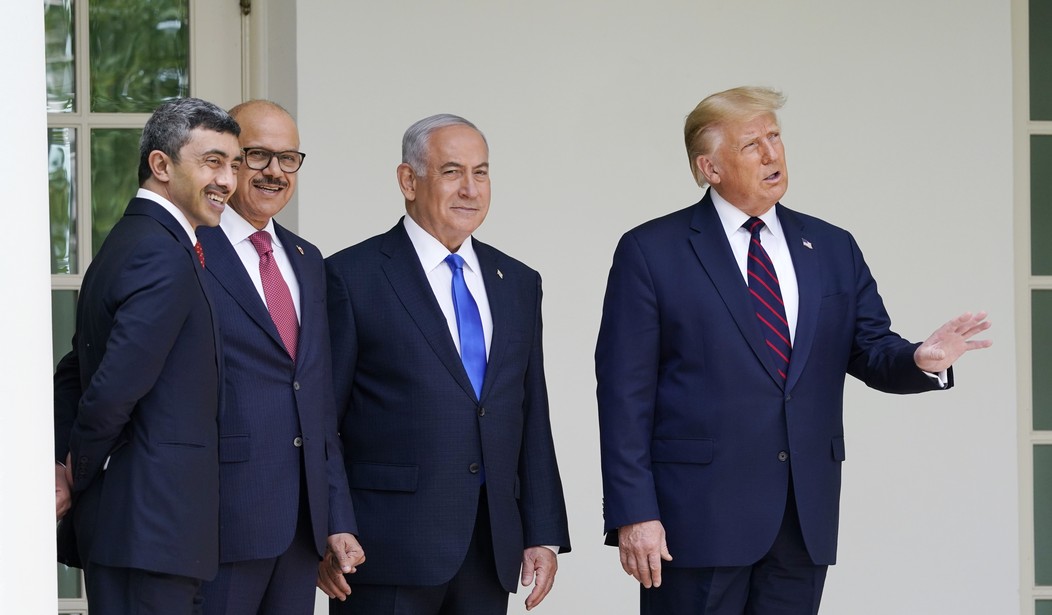Last week, I wrote about the economic, social, and cultural trends in Israel and the Sunni Arab nations that contributed to the Abraham Accords, enduring even amid a military conflict. Since the cease-fire, there are indications the peace deals did not simply survive, but they are getting stronger. It also appears the United States is likely to forfeit its hegemony in the Sunni Arab world.
A return to the Iran policy of Barack Obama led by foreign policy disasters President Joe Biden and Climate Czar John Kerry is unacceptable in countries that view Iran as an existential threat. Israel and the Sunni Arab nations share this perspective. It seems that isolating their common enemy is overshadowing religious and historical conflicts even when it comes to the Palestinian issue.
According to the Israeli ambassador to the United Arab Emirates (UAE), Eitan Na’eh, agreed-upon actions between the two countries are continuing at pace:
“It doesn’t mean that the challenges go away, it doesn’t mean that there are not that many people that will try to challenge it, who will try to test it but I think that the determination is here, the strategic decision is here and we are back to normal to build relations, to sign agreements, to create contacts, to build our embassy here, so for us we are continuing and that’s the message that we get from our Emirati counterparts.”
The two countries are also focusing on their shared history in a way that is nearly unbelievable:
One sign of this growing relationship is the opening of first-ever Holocaust Memorial exhibit in the Arabian Gulf in a museum in Dubai, UAE.
The exhibit at The Crossroads of Civilizations Museum is designed to raise awareness among local Emiratis, foreign workers and tourists. It explores the events leading up to the Holocaust and includes a tribute to Arab heroes who defended and saved Jews.
Following the cease-fire, Israel and the UAE signed a tax treaty to bolster the economic ties encouraged by the Abraham Accords through increased investment. This treaty follows agreements on direct flights, visa-free travel, investment protection, science, and technology. Na’eh is also not concerned about the recent election in Israel, or the probability that Prime Minister Benjamin Netanyahu will be replaced in a new coalition government.
At a recent global investment forum, he said that the emerging relationship goes deeper than the government. He noted that 85,000 Israelis visited Dubai in December of 2020 alone. As soon as COVID-19 travel restrictions lift, Israel looks forward to citizens of the UAE visiting. Na’eh also noted increased traffic to the Israeli Foreign Ministry social media pages, where they post in Arabic. With 56 million views in just a few days, he believes that the Arab world is discovering there are two sides in the Israeli-Palestinian conflict.
The most interesting development, and the one that will impact U.S. influence in the region, is the UAE announcing it is ready to facilitate Israel-Palestinian peace efforts:
The United Arab Emirates stands ready to facilitate peace efforts between Israel and the Palestinians, the de facto ruler of the Gulf state said in remarks carried on state media on Sunday.
Abu Dhabi Crown Prince Sheikh Mohammed bin Zayed al-Nahyan made the comments in a telephone call with Egyptian President Abdel Fattah al-Sisi, whose country, with U.S. support, brokered a ceasefire on Friday that ended the fiercest fighting in years between Israel and Islamist militant group Hamas.
With the UAE leading negotiations rather than the U.S., there is a possibility of making headway. As previously reported, the UAE is taking much more control over how the supplies and money sent to the Palestinians are used. The Emirati are insisting their contributions be used for projects that benefit the citizens in Palestinian-controlled areas, not to pay the families of terrorists and enrich the billionaire families in the area. Together with Saudi Arabia, they have significant leverage over the Palestinians and shared economic and foreign policy interests with Israel:
The UAE, which last year normalised ties with Israel, “is ready to work with all parties to maintain the ceasefire and explore new paths to reduce escalation and achieve peace”, state news agency WAM cited Sheikh Mohammed as saying.
The Crown Prince stressed however the need for “additional efforts, especially by Israeli and Palestinian leaders”.
Comments from Na’eh indicate that Israel will likely view the UAE’s efforts as made in good faith:
“As we can see with this [Holocaust] exhibition, this is the exact opposite of what we see in Gaza – tolerance. I think that what we see here in the whole normalization process is a departure from the past, from the wars and the battles and the rockets firing,” Na’eh said on the sidelines of the exhibit’s debut.
“At least to our ears, the UAE has called [for] the cessation of the killing from both sides. They were mourning the death in both sides,” Na’eh added.
Na’eh said it’s important to recognize that the Middle East is in a different place, to embrace it, and nurture those relations.
Joseph Levine, a localization specialist who lives near Tel-Aviv, tells me he is hopeful that Saudi Arabia will join the Abraham Accords if Israel continues to move forward in good faith. He has also said he would not be surprised if the current agreements extend to military defense cooperation in the future. While the Biden administration nuzzles the mullahs, the Sunni Arab world and Israel are moving forward without them. How this shift will affect U.S. leverage in the region as we become dependent on foreign fossil fuels again due to horrible environmental policy remains to be seen.










Join the conversation as a VIP Member